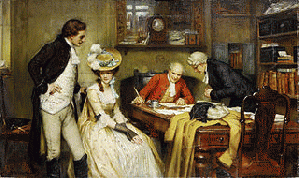Recently my inbox has been filled with eloquent emails from Deepak Chopra, Duane Elgin, Sam Harris, James O'Dea, Bruce Sanguin, Michael Dowd, Elisabet Sathouris, and many others -- all about the nature of authentic "rational" or "scientific" spirituality. And I have been talking about some of these same issues with Ken Wilber, Andrew Harvey, Craig Hamilton, Duane Elgin and Rick Hanson. Hundreds of smaller conversations are ebbing and flowing -- and to a certain degree, they're all about a single, big topic.
Under the surface of things, and completely invisible to most observers, a great indirect "negotiation" is taking place -- one with enormous implications for the future course of human culture.
The mind of rational science is reconciling itself with the truths encountered via spirituality, and the mind of trans-rational spirituality is reconciling itself more rigorously to the penetrating clarities of rigorous, evidence-based rationality. Each is realizing that they must reckon more fully with the other's incontrovertible truths. That means they're converging, headed for a "marriage" of sorts. This marriage, as it ripples through world culture, is likely to mark an epochal cultural sea-change.
I think that among our most prescient, original thinkers, there's a dawning awareness that the coming together of rationality with spirituality, the "marriage of science and spirit" is THE big thing happening now in terms of cultural evolution--an event on the scale of the Reformation or the Enlightenment. It is the most significant intellectual and cultural event of our time and it will reshape the future of human affairs.

320px-George_Sheridan_Knowles_ ...
(Image by (Not Known) commons.wikimedia.org, Author: Author Not Given) Details Source DMCA
This means that much is at stake, and there is no deep agreement about the precise terms on which this inevitable marriage will be consummated. In fact, the negotiations over the "pre-nup" bring together a wide range of participants, including some that seem more likely to have "irreconcilable differences" than to be candidates for matrimony.
Though there are, of course, shades of grey in this discussion, the differences seem to fall (very broadly, generalizing shamelessly) into two camps:
In one camp are rationalists, like Sam Harris, who have been recognizing and advocating for the benefits of mindfulness and meditative higher states and seeing a basis for transcending the narrowness of an overly reductive materialism. Harris credits contemplative traditions with confirming "some well-established truths about the human mind: our conventional sense of self is an illusion; positive emotions, such as compassion and patience, are teachable skills; and the way we think directly influences our experience of the world." Some see this as a basis for subsuming (some would even say "co-opting") a non-dogmatic (and perhaps even demystified) "not religious" spirituality into a new, more comprehensive and powerfully modernist rationality.
Although much attention is dutifully paid to the attitudes of the leaders and followers of organized religions, I don't think they are at the forefront of this synthesis.
In fact, the other camp is occupied by the many spiritual practitioners and mystics, myself included, who have taken to heart the implications of contemporary science, particularly quantum physics. We're inspired by the mind-blowing ideas that time and space are the same thing, and that energy and light are the same "stuff" as physical matter. We're especially inspired that our best scientific origin story -- the Big Bang, and the processes of cosmic physical evolution, biological evolution and cultural evolution -- says that every, every, everything (time + space + matter + energy) was once a tiny singularity. But we're also inspired by the great mystics and sages and their unifying vision of the world. We are arriving at a rational spiritual vision that is grounded in science but not in "flatland" materialism. We are having the experience of awakening as co-participants in a conscious universal Reality, sometimes called the "Living Universe" or the "Kosmos."
Each "side" envisions a marriage of science and spirit, but a marriage forged on very different terms. It is not a simple two-sided debate, though; there are myriad factions, each championing particular important "clauses in the contract."
This blog post is the first of a series on this topic. In future installments, I'll take a closer look at some of the key current ideas, and a few of the thinkers, who are proposing key terms for the "pre-nuptial agreement" for science and spirituality -- the great cultural synthesis of our time.






